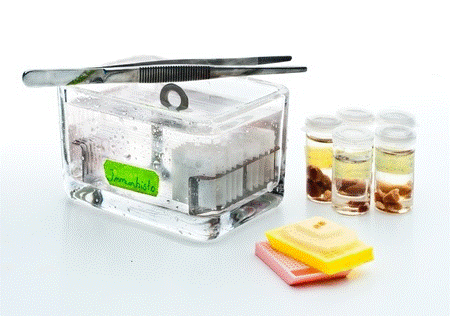For the past 100 years, formaldehyde based tissue fixation has been a universal practice. Yet it has some big drawbacks. This type of fixation isn't really optimal for many of the downstream methods used by researchers and clinics. Not to mention, formalin solutions produce carcinogenic vapors that require the use of fume hoods and hazardous waste disposal. Can you imagine how much toxic waste and energy consumption a century's worth of formaldehyde use adds up to? Is this the best fixation method possible?
I was intrigued by this open access report in Clinical Neuropathology about a formaldehyde fixation alternative. The authors provide the recipe and lab protocols for KINFix – a formalin-free, non-commercial fixative. KINFix combines the attributes of formaldehye fixation and freezing methods – and is non-toxic.
According to this report, KINFix produces high quality tissue samples for conventional and high tech methods. KINFix's alcohol based tissue fixation provides superior samples for immunohistology, proteomics, DNA, methylated DNA, and especially, mRNA analyses. The sample quality is on par with frozen samples. Yet you don't need to worry about long term molecular degradation, or taking up freezer space. Instead tissue samples can be paraffin-embedded, and stored at room temperature. KINFix fixation is easy to perform. The method can be standardized better than formalin cross-linking, because it works by protein coagulation, so there is no “over-fixation” problem. Essentially, KINFix is an optimized alcohol fixation solution.
There are a couple caveats. The authors acknowledge that there are certain formalin based artifacts that pathologists use diagnostically. Also, the quality assessment of long term paraffin-embedded samples storage is still ongoing. The inventors are currently suggesting the use of KINFix as a procedure 'complementary' to formalin and freezing methods in neuropathology labs.
In review, KINFix is low cost, no freezers are needed, no fume hoods are needed, no hazardous waste disposal is required...it sounds like a 'labconscious' technique to me!
See: Stefanits, H. et al Clin Neuropathol. 2016 Jan-Feb; 35(1): 3–12.

